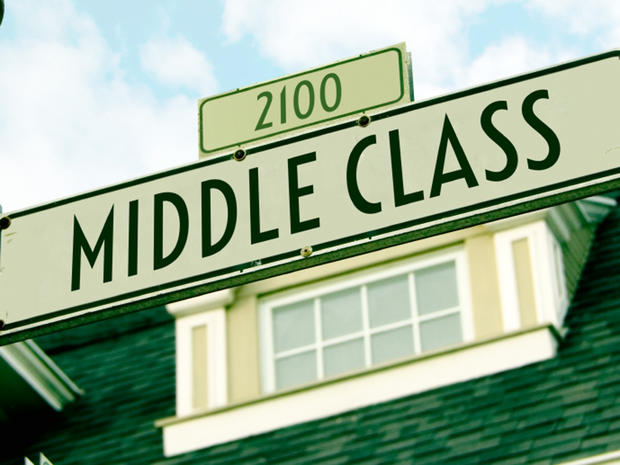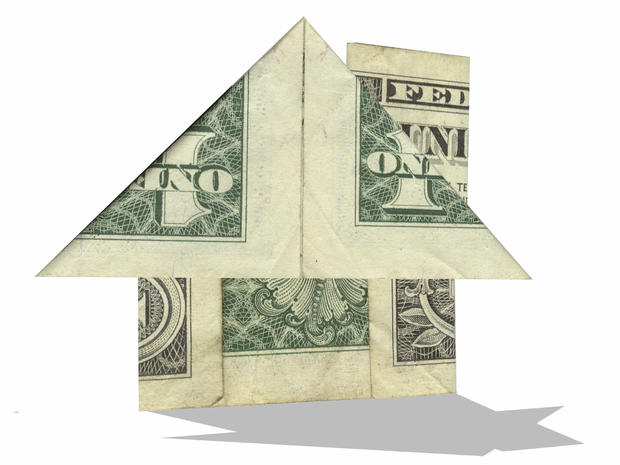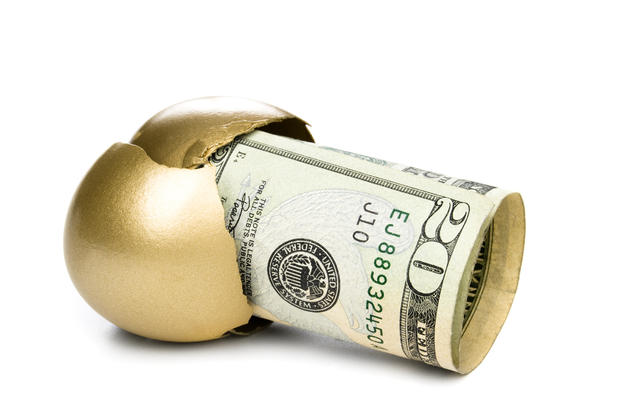8 ways to know if you're middle class
America's middle class. There may not be another demographic group that's so widely discussed, yet so difficult to define.
Politicians are desperate for the middle-class vote. Economists watch the middle class for signals about where the country is headed. Surveys show that many Americans think they're middle class, even if they aren't sure what that exactly means.
So, how can you tell if you're middle class? There's no strict definition. But researchers have carefully studied that broad swath of middle America, enough to at least develop some ideas of what being middle class truly means.
Do you fit the bill? Click ahead to see eight ways you might be middle class:
1. You earn between $36,000 and $109,000 a year
Median household income was $54,510 in February, according to the latest estimates from Sentier Research. That's up from just above the $51,000 mark in 2012.
Pew Research defines a middle-class household income as two-thirds to double the national median, or between about $36,000 and $109,000 a year.
Of course, a middle-class income can vary depending on where you live. In San Jose, California, it ranges between $51,000 and $182,000 a year, according to a recent analysis by NPR. But in Milwaukee, Wisconsin, the range drops to between $18,000 and $67,000 a year.
2. You own a home
Homeownership has long been a hallmark of the middle class. In a 2013 speech, President Obama called it "the most tangible cornerstone that lies at the heart of the American Dream, at the heart of middle-class life."
But owning a home became much harder after the financial crisis walloped the housing market. The homeownership rate fell to 64 percent in 2014, according to the U.S. Census Bureau, down from 69 percent a decade earlier.
"Perhaps the main new reality is that homeownership isn't as easy to attain as it has been during most of the decades after World War II," trade publication Commercial Property Executive reports. "For a lot of people, the money isn't there, because the American economy simply doesn't offer as many well-paying jobs as it used to."
3. You have a secure job
Americans may be changing their views on what it means to be middle class. In 1991, some 70 percent of people said that homeownership was essential to being in the middle class, according to Pew Research. Only a third said that having a "white-collar job" was key.
Fast-forward to 2012, when nearly nine out of 10 Americans said a secure job is essential to being in the middle class. Only 45 percent said owning a home was important.
4. You have health insurance
This was another hot topic in Pew's survey of middle-class characteristics. Two-thirds of adults said health insurance was necessary to be considered middle class.
Many Americans get health insurance through their work, so it goes hand-in-hand with a secure job that comes with the middle-class lifestyle.
The Affordable Care Act is making health coverage available to more lower-income Americans who previously couldn't afford it. As health insurance becomes more pervasive, it may become less of a signifier of middle-class culture.
5. You invest for retirement
Investing for the golden years is important to America's middle class, but that doesn't mean they do a very good job of it.
It has become more difficult for most Americans, including the middle class, to set enough money aside for the retirement years. Researchers with the Employee Benefit Research Institute ran some scenarios last year that looked at what would happen for Americans who spent a maximum 35 years in retirement.
Would people in the second- and third-income quartile -- the middle income quartiles -- run out of money? In the second-income quartile, 47 percent would fall short. In the third-income quartile, 28 percent would run out.
6. You went to college
To be sure, many households are able to reach middle-class income levels without a college education. But generally, when Americans think of middle-class families, surveys show they think of parents who went to college and are saving for a college education for their children.
Americans used to think that a college education was more essential for the middle-class label. In 1991, nearly half of those surveyed said a college education was important to the middle class. That number dropped to 37 percent in 2012, according to Pew.
7. You take family vacations
The family vacation "is a middle-class staple," writes James McWhinney at Investopedia. "Vacations demonstrate that a family has disposable income and has been successful enough to take time away from work to focus on leisure."
You'll need plenty of disposable income for some family vacations. The average American family spent nearly $4,600 on a summer vacation in 2013, according to American Express. As the economy has improved, consumers have begun planning more vacations and spending more on them as well.
8. You think you’re middle class
This may be the most important distinction of all: For many, being middle class is simply a state of mind.
It implies a commonality with the rest of the country, an implicit understanding that you're pursuing the American dream by working hard, saving money, being responsible and providing for your children.
It's also an acknowledgement that you're being rewarded for your efforts. You aren't filthy rich, but you're comfortable enough. "It's a feeling, a touchstone. It defies numbers," Xavier University political scientist Gene Beaupre told The Cincinnati Enquirer in 2013. "It's a mindset that says, 'I'm part of the working fabric of American culture.'"
Unfortunately, fewer people now consider themselves middle class, studies show. Only 44 percent of Americans described themselves as middle class last year, down from 53 percent in 2008. And that's not because a chunk of the country is suddenly more wealthy. More people were describing themselves as lower-middle class or poor.








